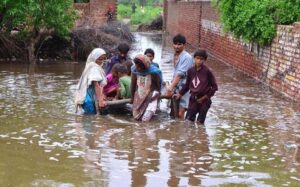Pakistan’s National Disaster Management Authority and the Economic Affairs Division also briefed ambassadors on the current status of the flood. The Foreign Office and NDMA is also communicating with the UN Resident Coordinator in Islamabad to launch a UN Flash Appeal on 30 August.
Pakistan Prime Minister Shehbaz Sharif on Friday convened a meeting of select Islamabad-based ambassadors, high commissioners and other senior members of the diplomatic corps, to brief them on flood situation, said the ongoing monsoon spell has caused unprecedented damage and devastation in Pakistan.
Prime Minister Sharif said that considering the urgency of the challenge, the government had decided to reach out to “friendly countries” and donors as flash floods and the torrential rains had badly hit around 33 million people across the country.
The prime minister underlined that 33 million people had been badly affected by the flash floods and torrential rainfalls.
He said all provinces of the country were now badly affected by the current spell of torrential rains that had led to flooding, resulting in the loss of over 900 lives, including 300 children. He said that as per the initial damage assessment, the losses caused by the floods were comparable to those Pakistan suffered during the flash floods of 2010-11.
“The ongoing rain spell has caused devastation across the country,” the Prime Minister tweeted after the meeting. “The losses, though yet to be documented, are comparable to flash floods of 2010. Grateful to the international community for their sympathies, condolences and pledges of support. Together we will build back better.”
UN Appeal in the offing
Pakistan’s National Disaster Management Authority and the Economic Affairs Division also briefed ambassadors on the current status of the flood and the rescue, and relief efforts as well as the need for immediate assistance.
The Foreign Office and NDMA is also communicating with the United Nations Resident Coordinator in Islamabad to launch a UN Flash Appeal on 30 August.
Shehbaz Sharif highlighted that he had already issued instructions to the federal and provincial governments to provide people with tents, drinking water, mosquito nets, food items, medicines and other equipment.
Noting that the climate change has made flooding worse, the prime minister emphasized rehabilitation and reconstruction of climate resilient infrastructure in Pakistan. He said that Pakistan’s carbon emission footprint was negligible but it was ranked at the eighth position among the countries exposed to the horrors of climate change.
Do also read: Pakistan Needs International Aid to Deliver Flood Relief
The meeting was attended by ambassadors and high commissioners of Australia, Canada, China, Japan, Kuwait, UAE, Turkey, South Korea, USA, Germany and senior diplomats of Bahrain, European Union, France, Oman, Qatar, UK, and Saudi Arabia. The country representative of World Food Programme was also present.
The prime minister mentioned that given the urgency of the challenge, the government had decided to reach out to the friendly countries, donors and the international financial institutions for their continued cooperation at this difficult time.

Climate change minister speaks up
Speaking on the occasion, foreign diplomats expressed condolences and sympathies to the people and the government of Pakistan on the loss of precious lives and damage to infrastructure in the disaster.
They assured the Government of Pakistan of their respective governments’ continued support to meet the requirements of the rescue and relief operations across the country.
Addressing the meeting of the National Assembly Standing Committee on Climate Change earlier in the day, Minister for Climate Change Sherry Rehman said that the abnormal monsoon torrential rains caused the heaviest floods in the country’s history.
She said the situation was bad as rains has not been taking any breaks with up to 1,100 millimetres rains in many disaster-hit areas, adding, “30 districts of Sindh have been submerged and this committee should take notice of that.”
On Thursday, Rehman had expressed the need for international aid agencies to provide Pakistan further support for providing relief and rebuilding infrastructure destroyed by the floods.
She said it was now time for donors and the world to support Pakistan, and in this light, asked the media to highlight the plight of flood victims, the rescue and relief efforts, and damages to life and property so that the stakeholders could manage a well-coordinated response with the public support.
She had said that it was not possible for a government or a province to solely handle such massive flooding and heavy rains.

